
Thorough Theologian
Albert’s greatest love of all was his love for God.
Albert so loved the natural sciences, waxing eloquent in his writings on everything from flowers to insects to fish to the squirrelly daily habits of the squirrels, because they all in small, diverse ways reflected the unspeakable, simple goodness and majesty of the Creator, from whom all creation flows. Albert knew so well how God speaks to us through creation, but he also knew that God has spoken to us directly too, in His revelation, and most directly of all through the words and the deeds of His Son incarnate.
Albert’s love for God is seen in his extensive knowledge of the Scriptures, of Church history, of the liturgy, and of the Eucharist. Albert left extensive commentaries on the Scriptures, among the most prominent being his Commentary on Saint Luke’s Gospel. He wrote beautifully about the Eucharist and offered practical advice on mastering the art of prayer to express our love for God.
Perhaps Albert’s most significant purely spiritual work, De Adherendo Deo (On Cleaving to God), is one that he might have not written in its entirety. The beautifully simple, although profoundly moving book, which has been called a worthy companion to Thomas à Kempis’s Imitation of Christ, is about “cleaving freely, confidently, nakedly, and firmly to God alone . . . since the goal of Christian perfection is the love by which we cleave to God.”
Charging Champion
The virtue of fortitude comes from the Latin fortis, “strength.” Saints Albert and Thomas would write a great deal about the nature of virtues, including fortitude, and Albert clearly not only knew of this spiritual strength but did not shy away from living it.
Fortitude employs the irascible appetite and can raise our ire to fight back to defend the good, even when this means facing difficult obstacles. We saw that Albert was happy bravely to champion the cause of the rights of the Dominicans and Franciscans when challenged by the secular professors of the University of Paris. We saw too a flicker of Albertian ire when he railed at those even within his order who tried to squelch the study of philosophy. Perhaps the most poignant and powerful example of Albertian fortitude, though, is how he defended his own greatest student not long after that student’s death.
On March 7, 1277, three years to the day after the death of Thomas Aquinas, Bishop Steven Tempier of Paris, having solicited input from various theologians, produced 218 propositions that were said to be contrary to the Catholic Faith. Among that list, sixteen propositions were clearly compatible with the writings of Thomas Aquinas. Some reports indicate that the elderly Albert traveled the three hundred miles to Paris on foot to meet Tempier’s challenge and champion his brilliant student’s thought. He began his speech to the learned professors by stating, “What glory it is for one who is living to be praised by those who are dead.” He went on to portray Saint Thomas as the one who truly lived, while his accusers of unorthodoxy were covered in shades of death through their ignorance and ill will. He defended the orthodoxy of Thomas’s writings, along with Thomas’s personal sanctity, offering to defend them both before an assemblage of competent men. He returned to Cologne and poured over Thomas’s writings, declaring to an assemblage of Dominicans that Thomas’s works were so masterful that he had “labored for all to the end of the world, and that henceforth all others would work in vain.”
Of course, the writings of Saint Thomas did not put an end to works in theology but would stimulate an endless stream of new work inspired by his brilliance as the Dominican Order and countless popes across the centuries have sung the praises for his works of theology. Thomas’s philosophical and theological sons and daughters would come to be called Thomists, and Albert himself is the first and the foremost among them.
Cherished Child
For many decades Albert the Great shone as one of the brightest lights in one of the greatest of centuries. His learning was unequalled, and he was known far and wide as a man who could get things done. The bark of his preaching and teaching had inflamed the hearts of countless students, friars, nuns, and parishioners who had heard and seen him. Recall, though, the legend that Blessed Mary had foretold that at the end of his days he would be bereft of his vast knowledge. A poignant tale records that Archbishop Sigfried had come to the Dominican convent to visit the elderly Albert one day and, knocking at the door of his cell, called out, “Albert, are you there?” The venerable master did not open the door, but merely answered: “Albert is no longer here; he was here once upon a time.”
It is said that the greatest encyclopedic mind of the century, the medieval memory master, began to lose his memory in the last weeks of his life. He retained the ability to say Mass, as he had done for so many years, but he removed himself ever more from the world, content to pray in his garden and his cell. The boots that had taken him all across Europe carried him daily to the site he had selected as the resting place of his body, as he prayerfully and peacefully prepared for the inevitable day of his death. His spirit strove solely to cleave closer to God.
In the twilight hours of November 15, 1280, clothed in the habit of the Order of Preachers, seated in a large wooden chair in his cell and surrounded by his brother friars in Christ, Saint Albert whispered that it had been a good thing to be a Dominican, and then, like a cherished child, his soul left to meet his heavenly Father and Mother.
+
This article is adapted from a chapter in Hounds of the Lord: Great Dominican Saints Every Catholic Should Know by Kevin Vost which is available from Sophia Institute Press. 
Art for this post on St. Albert the Great: Detail of Albertus Magnus auf dem Frankfurter Dominikanerstammbaum (Albertus Magnus on the Frankfurt Dominican family tree), Hans Holbein der Ältere, 1501, PD-US author’s life plus 70 years or less, Wikimedia Commons. Cover of Hounds of the Lord used with permission.
To read about another great Dominican saint, click HERE.



